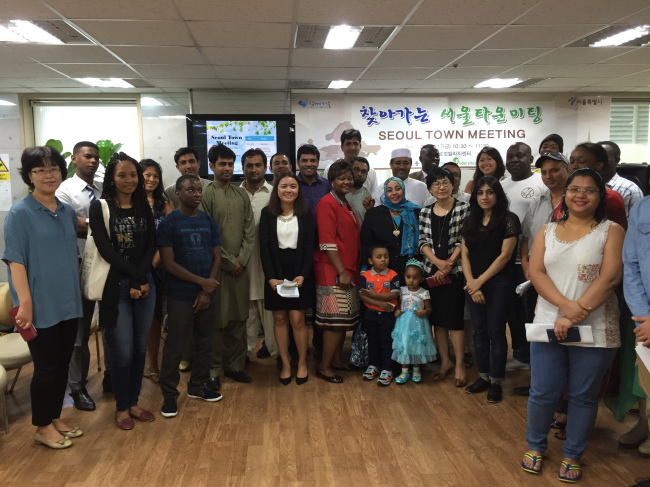Itaewon center hosts forum for Islamic, African expats
By Korea HeraldPublished : July 22, 2015 - 19:05
As part of ongoing efforts to help expats integrate into Korean society, the Itaewon Global Village Center held its first town meeting specifically for Islamic and African residents on Friday.
There are now 270,000 foreign residents in Seoul, according to the Seoul Metropolitan Government. Muslim and African residents make up a small minority of the total, but are two communities that have thrived in the Yongsan district.
The Itaewon Global Village Center is one of several operated by the Seoul Metropolitan Government’s Global Center that provides support for foreign residents in Seoul.
Based on a survey it conducted in June, the center opted to host a small-scale forum for Islamic and African residents.
There are now 270,000 foreign residents in Seoul, according to the Seoul Metropolitan Government. Muslim and African residents make up a small minority of the total, but are two communities that have thrived in the Yongsan district.
The Itaewon Global Village Center is one of several operated by the Seoul Metropolitan Government’s Global Center that provides support for foreign residents in Seoul.
Based on a survey it conducted in June, the center opted to host a small-scale forum for Islamic and African residents.

The language barrier was identified by 60 percent of respondents as the biggest problem faced when living in Seoul. While the center runs free Korean language classes, along with several other institutions, some were unable to take advantage of them.
One Pakistani participant identified long working hours as preventing himself and other factory workers from being able to attend language classes, and suggested a scheme to provide subsidized language classes in the workplace.
“They have no time to go to classes. They are working all the time. Sometimes by their own choice, and sometimes by force. … Is there any program that even though the persons are working in the factories, the factory will arrange that Korean study?”
Both Muslim and African participants in the town meeting noted the difficult visa conditions for the partners of expats posted in terms of employment.
“My wife just finished her master’s degree in public health but there is no employment for her, no legal employment. So we would like the government to look into that,” said one man from Nigeria.
Anjali Bansal, from India, said that she had had a pleasant stay in Korea thus far, but echoed these concerns about employment.
“I, and I’m sure there must be some other women in the community also, who are highly qualified, have good work experience, but they have no guidance on work status or if they can work here,” she said.
Cho Hyun-ock, the assistant mayor for Women and Family Affairs, attended the meeting to take notes on the issues raised by the foreigners, and empathized with the trials of expat life.
“We have had many Seoul town meetings but I feel really fortunate to hear the special stories of the people living in Itaewon, and to be told about your specific issues and problems. Your stories are not unfamiliar to me because I have experienced studying abroad in Germany with my kids, and I also suffered many inconveniences related to immigration and visas.”
Cho noted that she would forward the issues raised pertaining to areas outside of the Seoul Metropolitan Government’s jurisdiction with the central government.
By Louisa Studman, Intern reporter (louisastudman@heraldcorp.com)
-
Articles by Korea Herald








![[KH Explains] Hyundai's full hybrid edge to pay off amid slow transition to pure EVs](http://res.heraldm.com/phpwas/restmb_idxmake.php?idx=644&simg=/content/image/2024/04/18/20240418050645_0.jpg&u=20240419100350)







![[From the Scene] Monks, Buddhists hail return of remains of Buddhas](http://res.heraldm.com/phpwas/restmb_idxmake.php?idx=652&simg=/content/image/2024/04/19/20240419050617_0.jpg&u=20240419175937)

![[KH Explains] Hyundai's full hybrid edge to pay off amid slow transition to pure EVs](http://res.heraldm.com/phpwas/restmb_idxmake.php?idx=652&simg=/content/image/2024/04/18/20240418050645_0.jpg&u=20240419100350)

![[Today’s K-pop] Illit drops debut single remix](http://res.heraldm.com/phpwas/restmb_idxmake.php?idx=642&simg=/content/image/2024/04/19/20240419050612_0.jpg&u=)